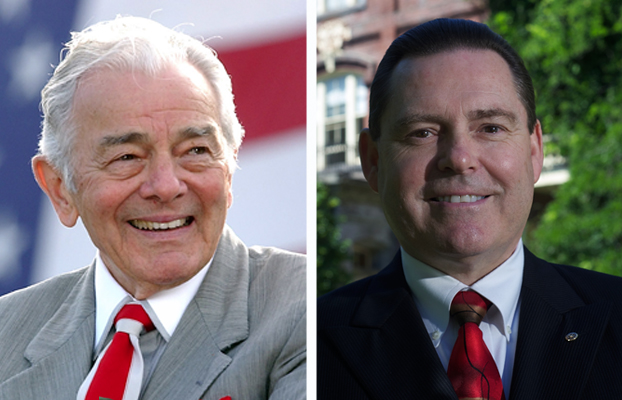The founder of USA Today, Al Neuharth, was a rainmaker.
Neuharth died Friday and many of us will miss him.
Back in 1982, then-Gannett Chairman Neuharth turned the company and its 90 or so local newspapers upside down with what was then considered a crazy idea:
Birth a national newspaper.
The execution of such a vision would drain the resources of the local newspapers. Money and talent would have to be shipped to D.C. And more than a few reporters at those local newspapers began to complain.
An early mentor of mine took a few of the complainers aside and gave them this sage advice.
“You either get on the train, or you get off the train. But for God’s sake, don’t get in front of the train.”
Neuharth was often described as a ruthless bully. But he was just as often described as being the guy who could get the job done. Any job. And he embraced his image. He wrote an autobiography: “Confessions of an SOB.”
He was a modern-day Paladin: “Have Gun — Will Travel.”
I hadn’t thought much about Al until I heard of his death. I spent six months — on and off — with him on a work assignment for USA Today that went to every state in the country. It was a life-changing experience.
But I also thought of this media giant because we were using the term “rainmaker” in a story we’ll publish Sunday.
The story is about the Fort Vancouver National Trust and the Pearson Air Museum. Included in that story is Elson Strahan. Strahan is the president and CEO of the Fort Vancouver National Trust.
In the story, we call Strahan a rainmaker.
Honestly, I’m not really sure how many people are following this dustup. I suspect the vast majority of Clark County residents are having trouble figuring out what is the big deal.
Essentially, it’s a power struggle over who should run the Pearson Air Museum. Should it be the local friendlies who keep their lawn mowed every week and leave fresh-baked cookies for their mail carriers? Or should it be the evil empire, otherwise known as the federal government?
Again, it’s not quite clear why most residents would care who opens the museum door in the morning or decides what functions can be held there. (Yes, there is more to it than this.)
Regardless, a part of our community is up in arms over this whole thing and we’re covering it.
I read our upcoming Sunday package on all of this and it’s quite good. We’re in the business of trying to deliver strong Sunday packages for our readers and this is one of them.
But it didn’t strike me as overly controversial or delicate until an email from Strahan — marked confidential — came across my desk.
Look, I’m not close to Elson, but I do know him. He has struck me as bright, articulate and gentlemanly. What else? He likes to slick back his hair, wears nice suits and makes a ton of dough.
And, again, we fairly describe him in our story as a rainmaker. By the way, that doesn’t mean he has to be a ruthless bully. That means he makes things happen.
The confidential email, frankly, was a little striking. It contained no smoking gun, no deep insight into the issue at hand. What it did show was a level of concern — from Strahan — that was way out of proportion to the story we were writing.
I’d define Strahan’s email as a knock-down email. It’s designed to knock down or discredit an upcoming story.
This isn’t an unusual tactic. Political types often use it to get ahead of a story they fear will be damaging to them. Soften the beaches, so to speak.
But there are two major problems with this tactic:
• You could be way off in what you think the story will be about.
• When someone shows this much concern about a story, it makes one wonder if — just maybe — there is something more that we haven’t discovered.
But let’s look at this first issue. The problem with trying to knock down a story before it’s even written is — well — it’s not written. It’s sort of like a blindfolded archer shooting toward the target.
Good luck on hitting the bull’s-eye.
So Strahan sort of flails away, based in large part on some of the questions he was asked for our story.
Journalism 101 will tell you a reporter is much better served asking too many questions than too few questions. Here’s one example. Strahan says this in his email:
“I believe (the) primary conclusion in the article is that I have a problem dealing with women in positions of authority and I have a pattern of getting my organizations to support my adversarial actions.”
Wrong. We draw no such conclusion in our story.
Another example is the subject line of the email, which said our story would be “primarily focused” on him.
Wrong. Strahan is, of course, a part of the overall story, but the story is primarily about the national trust and the air museum.
Strahan goes on to suggest there might be something other than just good reporting going on here. How? Well, his email said he felt he needed to “shed some light on her motives.”
“Her” in this case is Columbian reporter Erin Middlewood, one of the best reporters around. Questioning a reporter’s motives is an old trick, often used to divert attention away from the facts. Such is life.
One inside-the-newsroom insight: I was chatting with reporters to make sure the term “rainmaker” was used properly in describing Strahan. Most everyone agreed it was. But one younger reporter said there is an emerging definition that isn’t so kind. Apparently strip club patrons who throw money at the talent are said to make it rain. They are rainmakers. Hey — just in case — that’s not what we mean!
Readers are welcome to — and should — draw their own conclusions after reading the story. I’ve read the story. For me, Strahan comes off as a powerful player who gets things done. And if I were a betting man, I’d bet the friendlies will win out. Why? Because Strahan is a rainmaker.
Lou Brancaccio is The Columbian’s editor. Reach him at 360-735-4505, http://twitter.com/lounews or lou.brancaccio@columbian.com.





